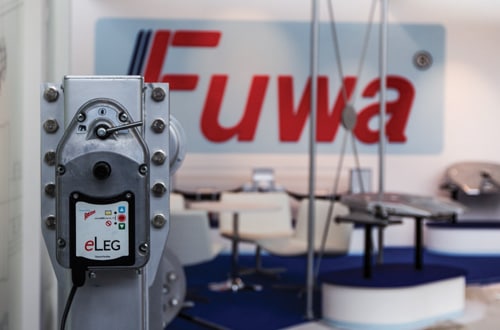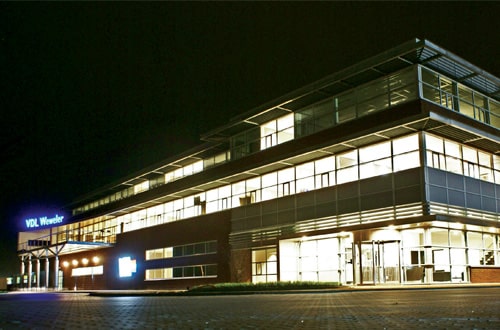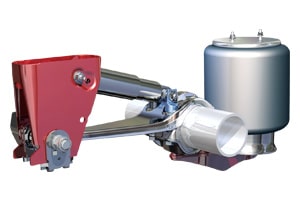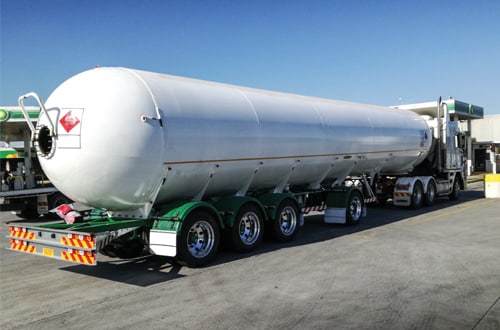
Transport equipment innovator, Peter Max, and running gear specialist, Fuwa K-Hitch, have teamed up to create Australia’s largest ever Performance-Based Standards-approved LPG tanker.
In a surprise announcement, Melbourne trailer specialist, Peter Max from Gas Tank Hire, and Fuwa K-Hitch (FHK) have just pulled the wraps off a new tanker design that could permanently change the country’s LPG transport market.
The LPG tanker boasts a Gross Vehicle Mass (GVM) of 50.5 tonnes and lays claim to the title of the “longest, largest, most sophisticated LPG tanker in Australia,” according to Peter. “No one has ever done anything like it in the world. This tanker carries 30 per cent more payload than a standard one, and we expect it to increase operator profitability by up to 60 per cent.”
After a lengthy 10-year development process, Peter says the ongoing evolution of the Performance-Based Standards (PBS) scheme and constant lobbying of the National Heavy Vehicle Regulator (NHVR) have finally made the quantum leap possible.
“The idea has been in development for quite some time, but it wasn’t until the advent of PBS that we found a way to make it a reality,” he says. “It is a great scheme that helps manufacturers design and build better, safer trailers that increase productivity and reduce the number of trucks on the road – and provided us with a pathway to make our vision a reality.”
While the Australian first is already approved to run at 50.5 tonnes in Victoria, New South Wales and South Australia under the PBS framework, Peter says he is currently working on approvals for the remaining states to ensure free movement nationwide.
NHVR Chief Engineer, Laszlo ‘Les’ Bruzsa, agrees that Peter’s design is a step forward in Australian tanker design, and therefore pushed hard for it to get through the PBS approval and certification process. “Because the tanker is the first of its kind, it has been a struggle to get it through the system,” he says. “But it was worth the effort. Peter’s tanker design is revolutionary and will be important for the future of road transport.”
The LPG tanker is unique for more than its size, Peter adds. Rather than the standard three-axle setup most LPG tankers use, his design adds a fourth axle in the centre of the tanker – which is where FKH’s expertise came into play.
Under its ‘belly’, the tanker features a self-steering FKH lift axle, while the front axle of the tri-group is a tapered FKH lift axle. As a result, the unit can run on two axles when empty. “It is the first trailer in Australia with a centre belly axle, so we knew we needed an experienced running gear expert on board the project,” Peter notes. “The four-axle set up we’ve developed together lowers the unit’s centre of gravity and spreads the load over a greater surface area, which is much more stable and protects the road’s integrity with less weight per tyre on the road – and also increases the unit’s braking ability.
“I knew from past projects that the FKH product is up there with the best on product quality, while still coming at a competitive price,” he adds. “But it’s been the team’s engineering know-how that made all the difference. If you want to discover unchartered territory like we did, you need to partner with suppliers that truly understand the matter and take ownership of the project.”
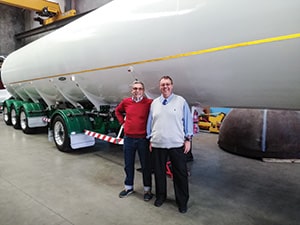
Agrees Chris Barrett of FKH, saying the objective was to provide a stable platform for the trailer whilst still allowing for tare savings to maximise productivity and ensuring compliance to all ADR and PBS requirements.
The axle and Weweler Ultra lite suspension welding and assembly process was carried out in the FKH workshop, Chris says, so Gas Tank Hire would receive a complete modular package with little lead-time. “I am very pleased that FKH has the product range, engineering capability and production capacity that allows us to work hand in hand with projects of this significance,” says Chris.
“The trailer is certainly an innovative design. I commend Peter and his team for their vision and perseverance in the design and certification on a development which will join the transport industry as a safe and highly productive vehicle.”
The complicated design took Peter six years to perfect, with another three years just to manufacture the prototype unit at his facility in the western Melbourne suburb of Sunshine.
Part of the process involved a substantial scientific evaluation process to perfect the way the steel was welded, he reveals. “We invested around a quarter of a million dollars to get the welding procedure right,” Peter explains. “I sounds bizarre to spend so much just to perfect the welding process, but it was necessary to comply with the latest LPG standards. Now we are the only business in the world capable of welding this particular type of steel to 100 per cent weld strength, while still retaining a certain flexibility in the material.”
The result is a tanker that is lighter and stronger, but still flexible. “Retaining the flexibility of the metal was an important part of the design process as the size of the tanker meant it had to be strong, but also able to flex a bit,” Peter says. “We also used the largest pump and full bore valves available for this type of tanker in order to speed up the loading and unloading process. Even smaller tankers don’t operate as swiftly as ours.”
For the record unit to go into operation, only one last series of on-road tests remains – and initial feedback is positive, Peter reveals. “We are seeing phenomenal results from the on-road tests that are currently taking place, in terms of handling, braking, load times and stability. This tanker has everything, because we were looking for every operator advantage possible during the design stage and brought in the best suppliers to get the job done.”
Peter is confident the unit will make a significant impact on an industry he says was “screaming out” for a new approach to tanker design. “Our new LPG tanker will make Australia a safer place,” he concludes. “I’m aware that other tanker manufacturers out there will copy my design, but I think it’s a good thing for the transport industry. Besides, I’m already hard at work on version two.”
Fast Fact: The 50.5 tonne LPG tanker boasts a number of design features to improve vehicle safety, including an additional internal baffle for stability. “Normal tankers have three internal baffles but we have included a fourth one,” says inventor, Peter Max. “Throughout the project, we made sure every design choice would improve vehicle safety, which is important for both industry and the public.”
Fast Fact: A FKH kingpin is fitted to suit the 20mm skid plate’s unique mounting, which Melbourne trailer specialist, Peter Max from Safety First, describes as reminiscent of an ice-cream cone. “Any shocks or vibrations the tanker may encounter during transit are dissipated into the side of the barrel, ensuring the longevity of the tanker even on rough roads,” explains Peter.


